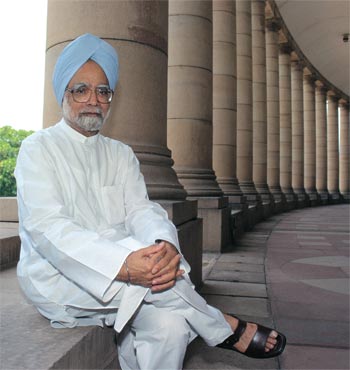 | « Back to article | Print this article |
Is it too late for govt to improve economic mood?
Business is better than the mood, Jeffrey Immelt, the chairman and CEO of General Electric, told an audience in Bangalore last week.
It's a theme he's been hammering around the world.
Be it the United States or Europe, India or China, bad mood seems to be depressing businessmen more than bad business.
If Immelt's judgement is right, the question would be: how come businessmen are not looking as much at bottom lines as they are at headlines?
It's the headlines around the world that depress the mood. So is the mood driving the economy down, or is an economy on the decline driving the mood down?
The classic Keynesian view of business and policy is that investment decisions are based on expectations.
If these expectations are what we call the 'mood', then the Keynesian answer would be that it is the mood that is getting down business rather than the other way round.
Managing expectations lies at the core of economic governance in a modern economy.
Being a diehard student of Keynesian macroeconomics, India's Prime Minister Manmohan Singh quite understandably told the media last week that the reason for all the bad media his government was getting was that it had "failed to manage perceptions".
Click NEXT to read more...
Is it too late for govt to improve economic mood?
An improvement in the performance of the government does not automatically translate into a better image unless positive perceptions are actively generated.
To be fair, it is partly a 'chicken-and-egg' kind of issue.
If everyone is feeling down and out, they don't perform to the best of their capability and if they don't perform well things turn out bad and that gets everyone down and out.
Both Immelt and Dr Singh will find support for their view from a best-selling writer who thinks 'mood matters'.
Futurologist John Casti published a best-seller last year titled Mood Matters: From Rising Skirt Lengths to the Collapse of World Powers, concluding that: "Most people think that the outcome of elections causes the mood of the country to change.
"The opposite is true: The mood of the country determines the outcome of elections.
"Most people think that a plethora of happy popular music on the charts makes the public happy and that a plethora of depressing popular music on the charts makes the public depressed.
Click NEXT to read more...
Is it too late for govt to improve economic mood?
"The opposite is true: A happy public pushes happy songs up the charts, and a depressed public pushes depressing songs up the charts.
"Most people think that a productive economy makes people optimistic and that an unproductive economy makes people pessimistic.
"The opposite is true: Optimistic people make a productive economy, and pessimistic people make an unproductive one.
"Most people think that peace makes people content and tolerant while wars make people angry, fearful and patriotic.
"The opposite is true: Content and tolerant people make peace, while angry, fearful and patriotic people make war."
Both Immelt and Dr Singh may have read Casti.
Question is what can anyone do to alter the mood?
Immelt would want Americans, Europeans and even Indians to feel a bit more optimistic about the future so that they would then act in ways that would help realise their expectations.
Consume more, said Lord Keynes, when Europe was down and out.
Enrich yourself, said Deng Xiaoping to get the Chinese to get them to invest more, consume more and earn more.
At even 7.5 per cent rate of growth per annum, India is not badly off. It is better off than the average rate of growth for the period 1947 to 1991.
Click NEXT to read more...
Is it too late for govt to improve economic mood?
When the Indian economy logged an average of 7.5 per cent growth in the period 1993-97, it was hailed as a 'dream run' for India. Coming as that period did on top of a decade of 5.5 per cent growth, it was naturally good news.
Today's 7.5 per cent comes after a similar dream run of over nine per cent per annum growth during Dr Singh's first term in office.
Understandably, there is some disappointment that India is unable to return to that trajectory.
It is this 'below par' performance that is clearly one major factor shaping the 'mood' in India today.
But more than the numbers it is the overall feeling that in its first term in office the United Progressive Alliance government had performed better than in its second term UPA-2.
This feeling was there even in 2010. Perhaps at that time 'perception management' may have helped.
Today, perception management alone cannot and will not do the trick. There is no longer any 'chicken-and-egg' conundrum.
Someone famously said: "You cannot make an omelette without breaking eggs."
And, both UPA chairperson Sonia Gandhi and Prime Minister Singh have a lot of eggs and eggheads around that they need to break to cook a new omelette.




